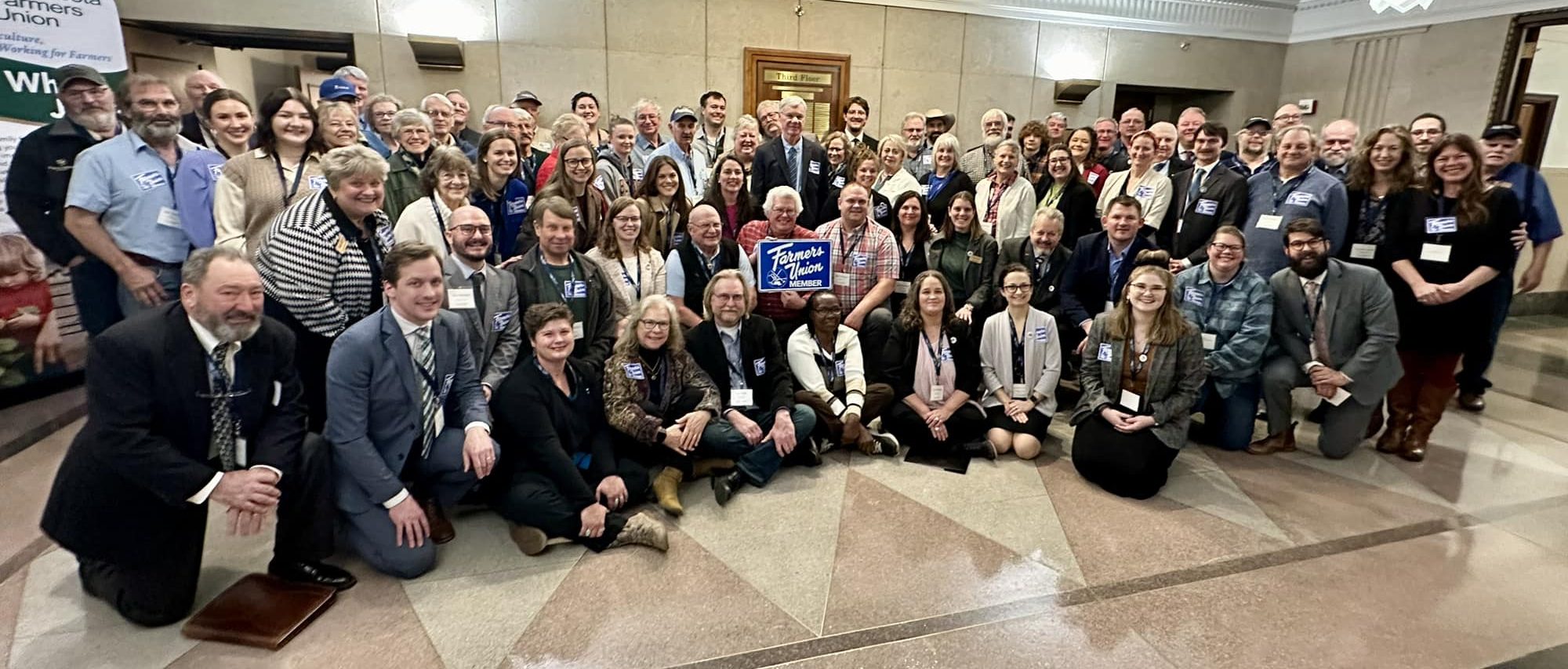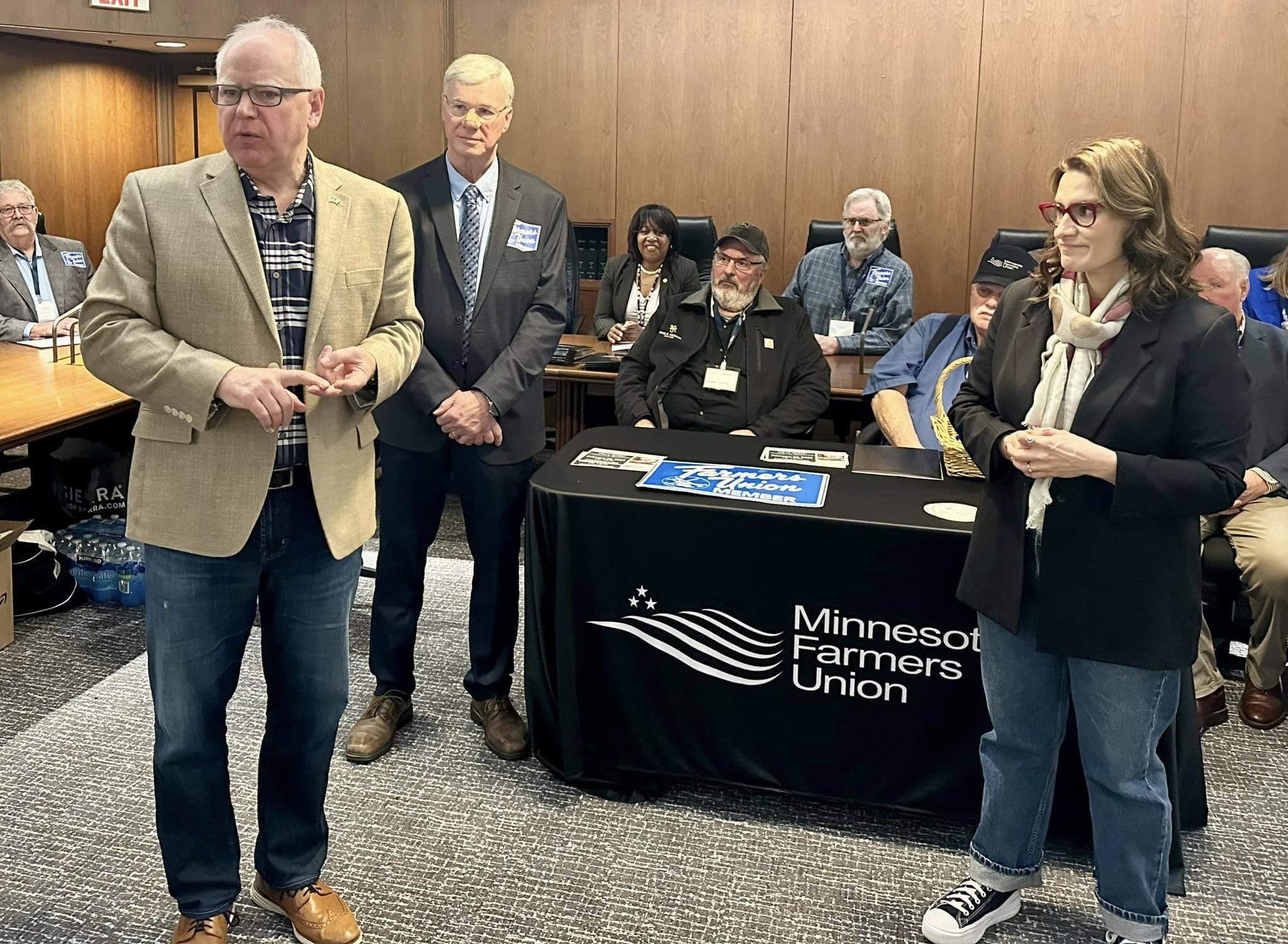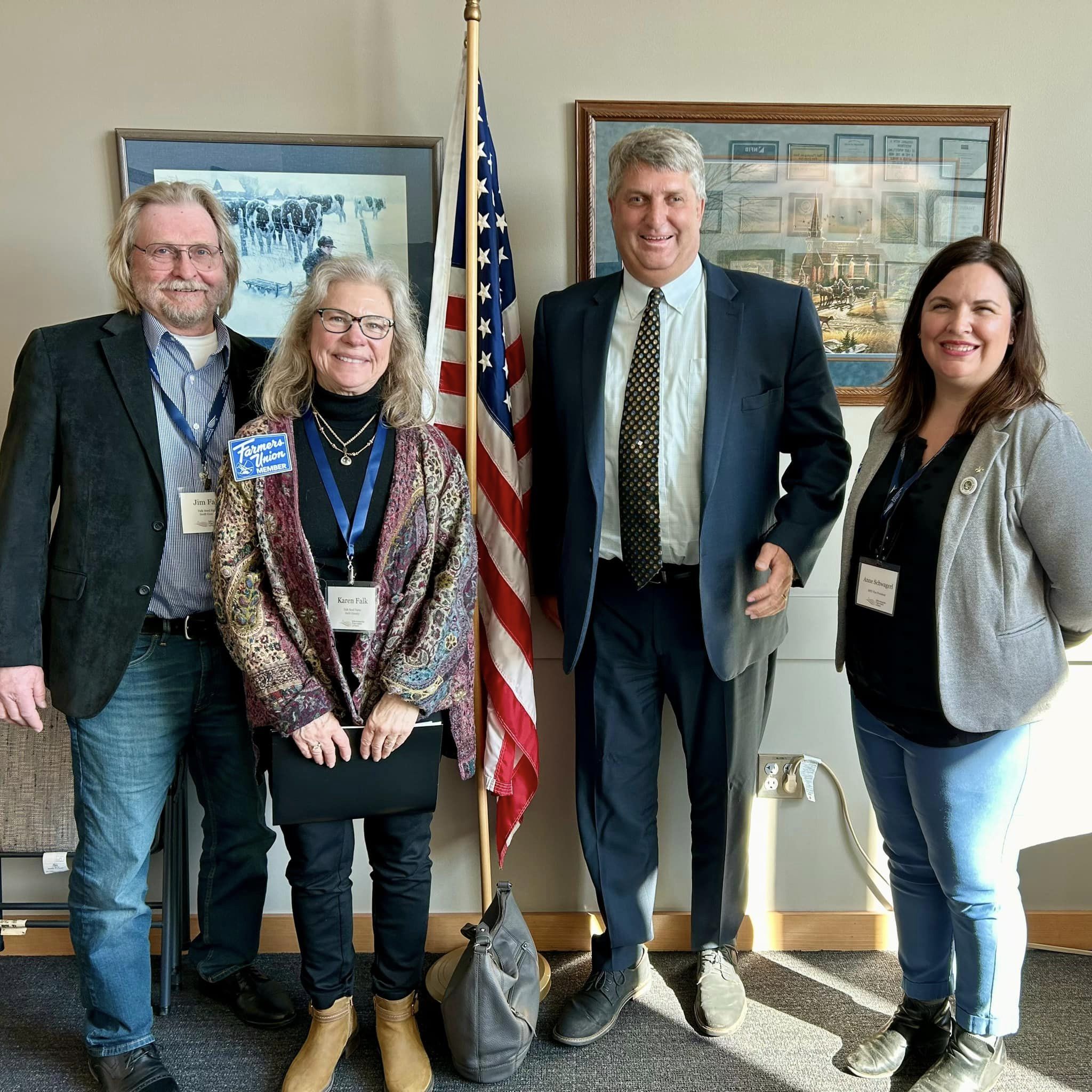Legislative Update: Successful Lobby Day held
Just one week after legislators gathered in St. Paul for the start of the 2024 legislative session, MFU members from across the state gathered for our annual Lobby Day. More than 75 members made the trip to meet lawmakers about making healthcare more affordable, passing Right to Repair, creating climate resilience, addressing the shortage of large animal veterinarians, protecting the agriculture budget and a host of other priorities defined in through our grassroots process.
As in recent years, Lobby Day participants gathered in a House hearing room that MFU reserved to host meetings throughout the day. New this year, the space was packed, leaving standing room only at times throughout the day. Great attendance and blue Farmers Union stickers ensured that even lawmakers we weren’t meeting with felt MFU’s presence at the Capitol.

As a group, members met with Gov. Tim Walz, Lt. Gov. Peggy Flanagan, Attorney General Keith Ellison, House Speaker Melissa Hortman, DFL-Brooklyn Park, House Majority Leader Jamie Long, DFL-Minneapolis, Senate Agriculture Committee Chair Aric Putnam, DFL-St. Cloud, House Agriculture Committee Chair Samantha Vang, DFL-Brooklyn Center, House Agriculture Ranking Member Paul Anderson, R-Starbuck, and agency heads from the Minnesota Departments of Agriculture, Transportation, Natural Resources and Commerce. They also broke out into smaller groups to attend meetings with their local representatives, which were scheduled by MFU’s legislative team.
The day kicked off earlier than expected with drop-in visits from House Ag Vice Chair Kristi Pursell, DFL-Northfield, Rep. Ethan Cha, DFL-Woodbury, Rep. Nathan Nelson, R-Hinckley, and Rep. Koahly Her, DFL-St. Paul, all of whom were eager to meet with the group. It is a powerful statement and appreciated when lawmakers are working to meet with you. These lawmakers have championed MFU priority issues at the Capitol and not only because they all can draw on their direct experience in agriculture. Rep. Nelson is an MFU member and raises beef cattle in Pine County on his family’s historic dairy, for example, and Rep. Cha’s raised cattle and grew alfalfa in California’s Central Valley following his family’s long history of farming in Laos and Thailand.
Next, we were joined by Deputy Commissioner Andrea Vaubel, Assistant Commissioner Patrice Bailey, and Assistant Commissioner Peder Kjeseth from the Minnesota Department of Agriculture. They thanked MFU for our work on important initiatives from green fertilizer to the Emerging Farmers Office, both of which are being implemented following last session. They also answered questions about the projected shortfall in the department’s Agricultural Growth, Research, and Innovation (AGRI) program, which houses the state’s work on farm to school, biofuels infrastructure, meat processing, urban agriculture, livestock investment and county fairs. In short, funding for this program was scheduled to sunset in 2025 and the legislature still hasn’t completely filled that gap.
Next we were joined by Chair Putnam, who started by thanking those in the room who hosted farm visits this summer. In addition to listening sessions, Putnam set a new bar this summer and fall, visiting more than 50 farms across the state. If you’d like to host a lawmaker on your farm, please reach out. And know that it’s powerful.
After highlighting the grain indemnity fund, meat processing and other issues he was glad to advance with MFU, Chair Putnam took questions on issues expected before the legislature this session. Jim Joens of Nobles County talked about the need for Right to Repair based on his experience working with his son at his independent repair shop. He described frustrating situations—including where equipment was stranded in a roadway—because of how manufacturers continue to restrict access to the critical software functions needed to unlock equipment once they’ve made repairs.
Alan Perish of Todd County raised consolidation in the dairy industry. According to the latest ag census, Minnesota lost nearly 1,500 dairy farms between 2017 and 2022 despite the state adding cows. Putnam highlighted a bill he’s put forward (SF4234) to require a higher level of permitting for dairies over 10,000 animal units, a change that at present is likely to affect just one business now operating in Minnesota.
Next, Attorney General Ellison continued the conversation on Right to Repair and dairy. He also highlighted his partnership with MFU on antitrust work and reintroduced his now expanded antitrust team. Aaron Chervestad of Pennington County raised the issue of cellular communication in Northwestern Minnesota. Despite paying for service, coverage is spotty and the companies offer little help, he said, citing a combine fire last fall where the 911 call was dropped.
Ellison talked about the choice we made to illuminate all of America through rural electrification and made sure Chervestad was connected with the staff in his office who could follow up. You can reach the Attorney General’s Office here.
House Agriculture Chair Vang also highlighted her past work with the group and raised Right to Repair in recognition that it is of particular interest to farmers. Nikki Warner of Hennepin County kicked things off with a question about the agriculture budget and the shortfall in AGRI to which Chair Vang made clear that the shortfall needed to be addressed to maintain current programs. Kelsey Zaavedra of Chisago County also raised the issue of small farmers (less than 10 acres) not qualifying for the homestead tax credit, an issue MFU is working to address this session. Danny Lundell of Goodhue County and Dan Wilson of Winona County highlighted the importance of the Agriculture Committee’s work on broadband.
Through the rest of the day, members discussed the Beginning Farmer and Ag to School Tax Credits with Revenue Commissioner Paul Marquart; road repairs and clean fuel policy with Transportation Commissioner Nancy Daubenberger; deer depredation, wolves and land management with Natural Resources Assistant Commissioner Bob Meier; and insurance rates with the Department of Commerce. Members also had important meetings with House leaders, Speaker Hortman and Majority Leader Long, both of which highlighted the need for better and more affordable healthcare and a MinnesotaCare Public Option.

Gov. Tim Walz and Lt. Gov. Peggy Flanagan spoke with MFU members, including MFU President Gary Wertish, standing.
“As a general farm organization, it’s important that we make our voices heard on issues that affect all farmers,” said MFU Vice President Anne Schwagerl, in a news release following Lobby Day. “The high cost of healthcare is one of those issues. For too long, we’ve heard from members who are priced out of coverage, or whose kids can’t afford to leave their jobs in town to take over the family farm. If we want vibrant rural communities, thriving rural schools and new farm families on the land, making health coverage more affordable is critical. We’ve worked on this issue now for years and we’re counting on lawmakers to get it done.”
“Thank you to all the MFU members who traveled to St. Paul to share your stories with legislators during Lobby Day. Your engagement is irreplaceable as legislators move forward to enact legislation that impacts all of us,” said MFU President Gary Wertish. “A thank you also to the policymakers who took time to visit with Farmers Union members. By working together, we will build a Minnesota where everyone can build a life in agriculture.”
Following Lobby Day, MFU again hosted a successful legislative reception at Farmers Kitchen and Bar, which provided members an informal opportunity to connect with policymakers. Unsurprisingly, the food—sourced locally from MFU members—was a hit. If you weren’t able to join us for Lobby Day, we hope you consider it in next year.
State legislative action
While MFU was busy with Lobby Day, of course the legislature didn’t miss a beat. At the top of their list was to quickly pass a fix to last year’s tax bill. The $4 billion tax package passed last year (the largest in history) inadvertently shrunk the amount of the individual income tax standard deduction to 2019 levels, omitting four years of inflation adjustments. On Feb. 19 the House passed the legislation on a bipartisan 128-2 vote and the Senate quickly followed suit. Under the fix, the standard deduction amount for tax year 2023 would be $27,650 for married joint or surviving spouse filers, $20,800 for head of household filers, and $13,825 for all other filers and those amounts would be indexed to inflation in future tax years.

Jim and Karen Falk and MFU Vice President Anne Schwagerl met with Sen. Torrey Westrom, R-Alexandria.
Also on taxes, last week the House Taxes Committee received an update from the Minnesota Department of Revenue (DOR) about the state’s new refundable Child Tax Credit that was approved during last year’s legislative session. The credit is worth up to $1,750 per child for households earning up to $96,250 a year. The Department is estimating that approximately 300,000 families will qualify this year for the credit. The DOR has also started discussions with stakeholders about an optional advanced version of this new credit that would be available in 2025. This would allow qualifying families to receive up to 50% of the credit prior to filing their taxes. The Department is thinking through design details such as how families would opt-in and how many advanced payments would be made. As always, if you have feedback we should be relaying to the Department of Revenue, we’ll be eager to hear it.
In the House and Senate Agriculture Committees, lawmakers have been focused on nitrates in groundwater, particularly in the karst region of Southeast Minnesota. In early hearings, both bodies heard extensive overviews from state agencies about their work on this issue to date. This follows a request from the U.S. Environmental Protection Agency (EPA), requiring Minnesota Department of Health (MDH), Minnesota Pollution Control Agency (MPCA) and Minnesota Department of Agriculture (MDA) to develop a coordinated and comprehensive work plan to reduce nitrate contamination of drinking water in eight southeast Minnesota counties.
As farmers and others in that region know well, the unique geography of southeast Minnesota makes groundwater more vulnerable. While most Minnesotans have access to clean drinking water, some wells have tested above the public health risk limit for nitrates, leading the federal government to request the state to address this important issue on two tracks. First, to act quickly to ensure that everyone with impaired wells has access to safe drinking water. And second, to take long-term, sustained action to reduce the risk of nitrate pollution from fertilizing crops, raising livestock and other activities. MDA is working to address this issue and lift up local solutions. You can read more about MDA’s work here.
This is a complex and generational issue for which there is no silver bullet and a variety of interventions are being discussed at the legislature.
First, one of the big priorities from the governor this session is the capital investment proposal, also called the bonding bill. Covering a wide range of infrastructure investments across the state, the governor’s recommendations also include a number of projects focused on clean water. These include $2 million for purchasing and installing nitrate sensors to develop a continuous nitrate monitoring system in support of the state’s nutrient reduction strategy, $39 million for a State Revolving Fund Loan Program which would provide matching dollars for EPA and other federal funds to increase the capacity of the Clean Water and Drinking Water Revolving Funds, $23.4 million for a Water Infrastructure Funding program which would provide supplemental assistance for communities to build clean water and drinking water infrastructure projects, including those funded through USDA’s Rural Development programs, and $10 million for private well contaminant mitigation efforts.
Second, the state’s Clean Water Council has proposed an additional one-time request for $18 million from the Clean Water Fund for in part for efforts that address the nitrate issues in the southeastern part of the state. The request includes $1 million for implementation of the MDA’s Nitrogen Fertilizer Management Plan, $1.4 million for the MDA’s Agricultural Best Management Practices Loan Program, $2 million for the Board of Soil and Water Resources (BWSR) for working land and floodplain easements in the eight counties covered in the EPA response, and $6.3 million for the Department of Health’s Southeast Minnesota nitrate response. Peter Schwagerl of Big Stone County represents MFU on the Clean Water Council.
Third, the House Agriculture Committee is hearing two bills, both to be heard on Thursday, Feb. 29, HF4135, introduced by House Environment Chair Rick Hansen, DFL-St. Paul, would levy a new .99 cent per ton fee on fertilizer in order to pay for public health interventions in the southeast. MFU plans to share concern about this proposal and how it could affect farmers going into what is expected to be a downturn in the farm economy. It is also unclear how this will raise funds on the timeline needed to address the EPA petition. HF4044, introduced by Rep. Steve Jacob, R-Altura, and cosponsored by Rep. Kristi Pursell, DFL-Northfield, and a list of 24 bipartisan coauthors would pilot a new property tax credit for farmers enrolled in Minnesota’s Agricultural Water Quality Certification Program (MAWQCP) in the eight southeast counties covered by the petition. While again not the silver bullet, this could generate interest a program with a proven record of success and MFU plans to share support.
Federal legislation
On the federal level, National Farmers Union (NFU) has been working hard to defend rulemaking that would lead to stronger enforcement of the Packers and Stockyards Act. Last week, NFU sent a letter to leaders of the House and Senate Appropriations Committees urging them to oppose a harmful policy rider that some are insisting be past as part of a government funding package. The letter, signed by national, regional and state groups, points out “opponents of competitive agricultural markets are seeking to roll back the work USDA has already completed, prevent USDA from making additional progress on these rules, and prevent any similar effort in the future.”
“Blocking USDA’s work would be a direct hit to fair markets,” said NFU President Rob Larew in a statement. “Congress should champion family farmers and consumers, not bow to meatpacking monopolies. We urge them to discard this harmful proposal once and for all.”
Earlier this week, the first rule to strengthen enforcement of the P&S Act went into effect. But incredibly important rules have yet to be finalized or released for comment. The “inclusive competition” rule is in the final review stages, while several rules remain to be released, including on abuses in poultry tournaments, and a rule intended to address USDA’s long-standing interpretation that is unnecessary under the P&S Act to demonstrate industry-wide harm to establish a violation of the Act, which several courts have failed to uphold.
MFU also joined a group letter to Secretary Vilsack urging the USDA to act quickly to provide relief for dairy farmers. He is scheduled to appear before the Senate Agriculture Committee this week.
MDA grant programs
Finally, MDA released the next step in their work to develop a grant program that will help farmer-owned coops invest in green fertilizer production and announced an open application for cooperative development grants, both of which MFU worked hard to pass last session.
As always, if you have questions, thoughts or concerns about MFU’s legislative work, please reach out to Stu at stu@mfu.org or (320) 232-3047.
